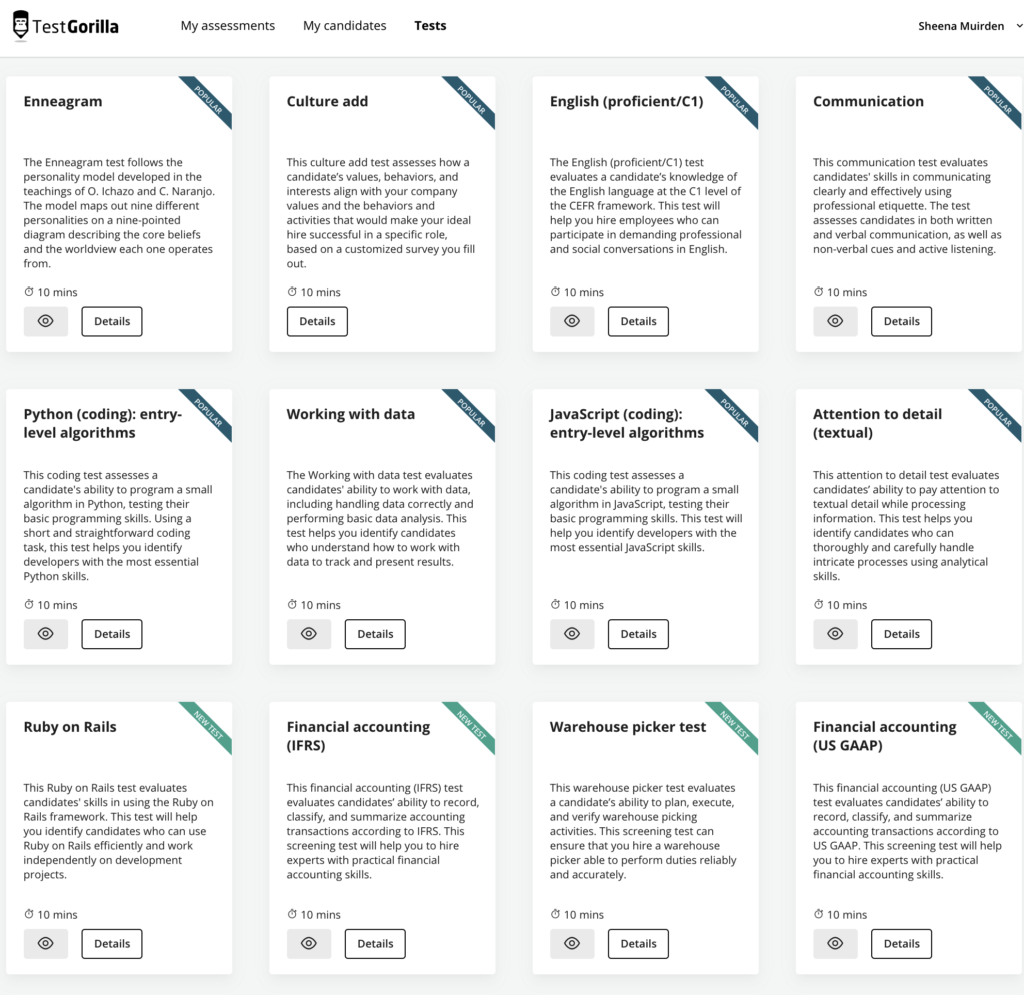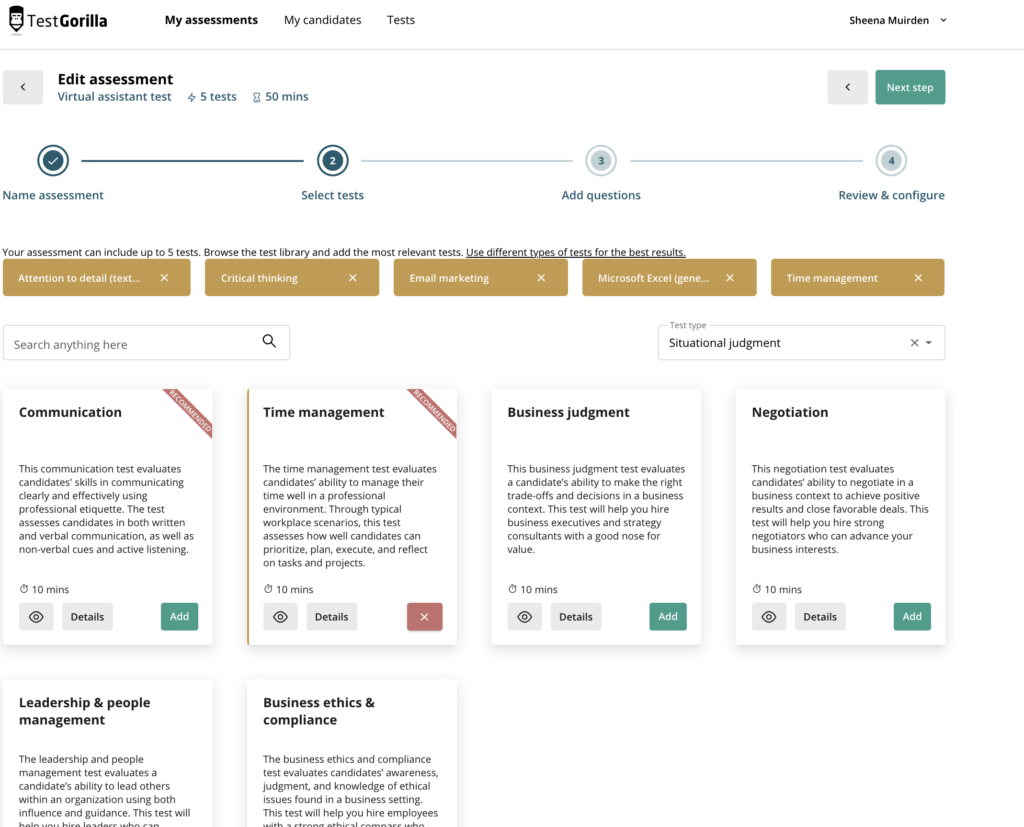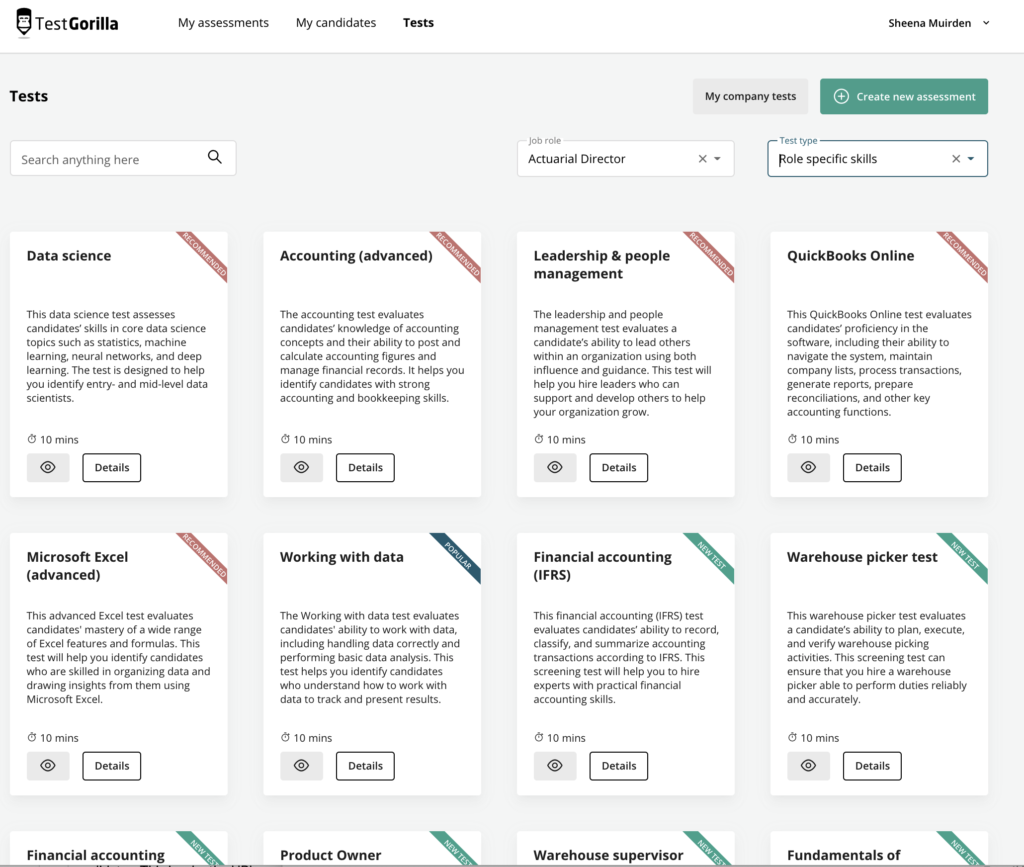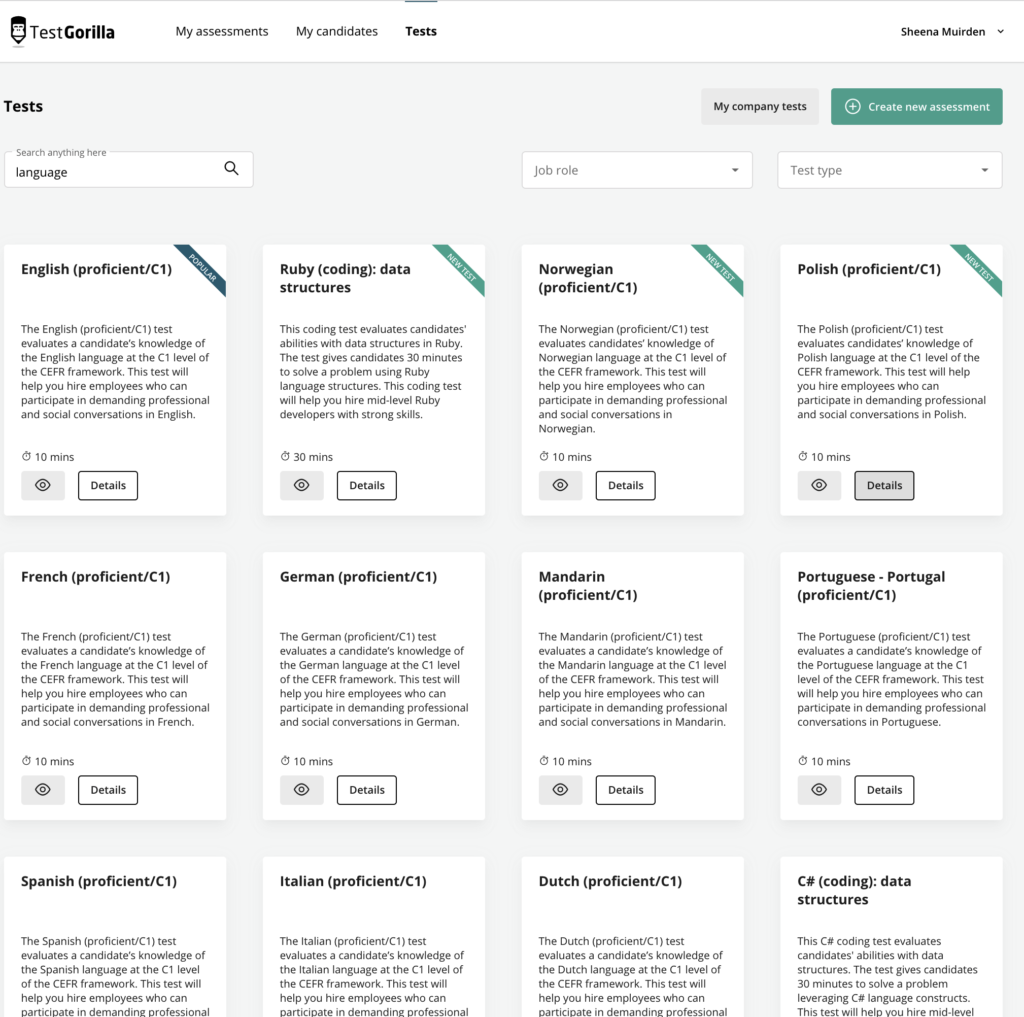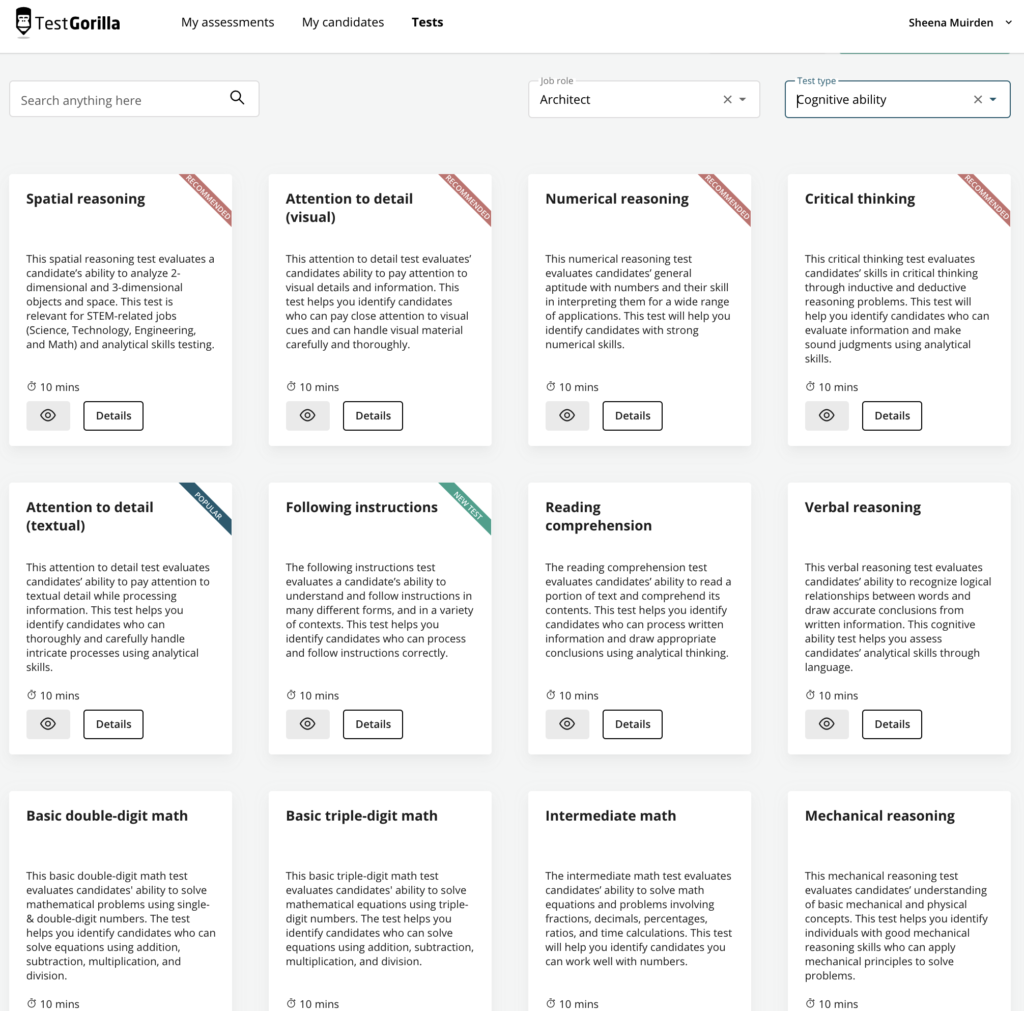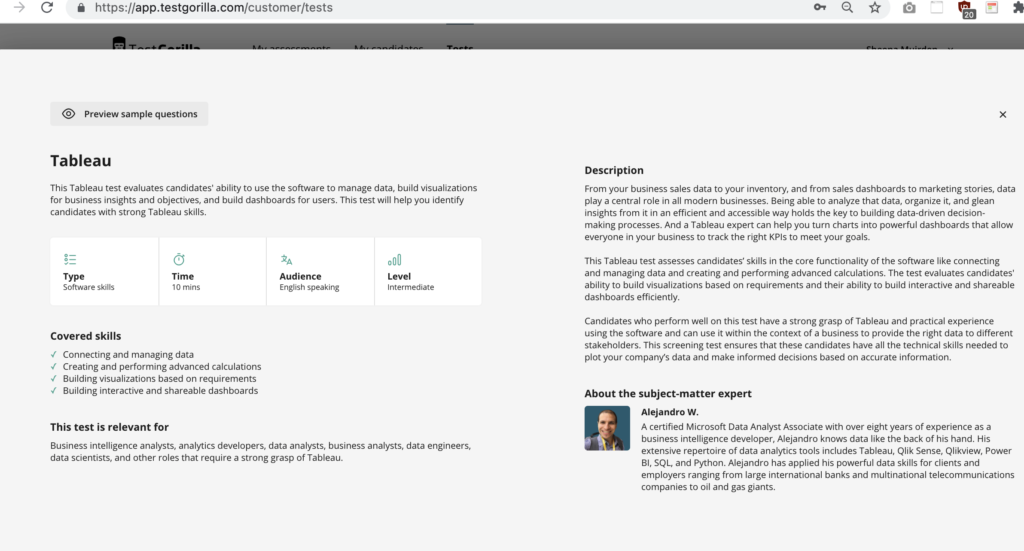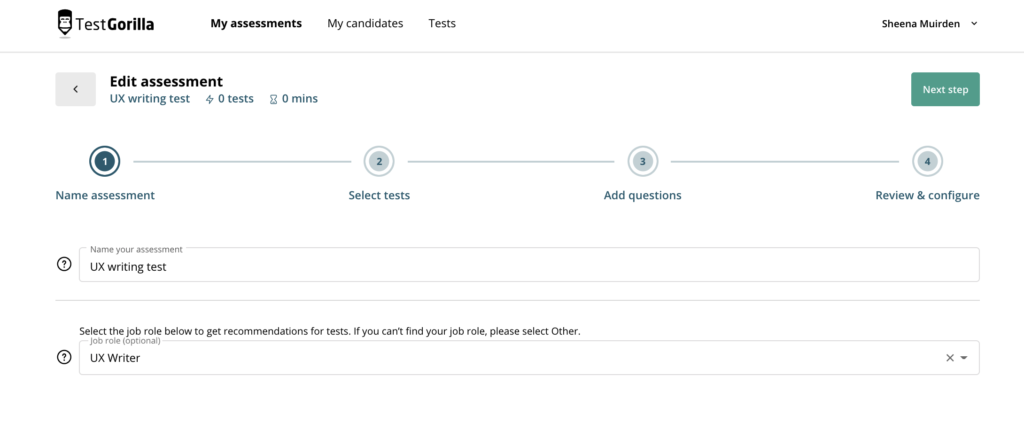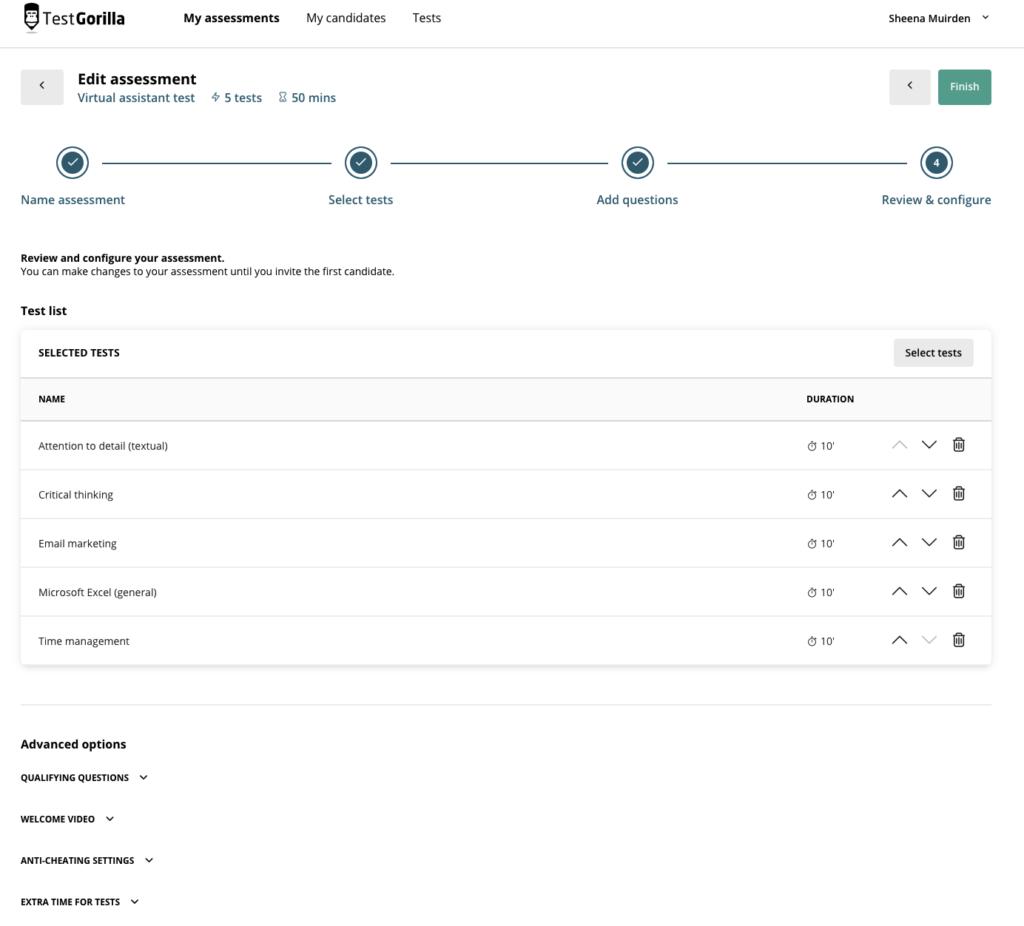Everything recruiters need to know about candidate skills assessment tests
Every recruiter would love to spend less time reading resumes.
If that’s resonating with you, then candidate skills assessment tests are exactly what you need.
Research suggests the majority of companies are already using some type of pre-employment assessment in their hiring process. Skills assessment tests, in particular, can help you screen out unqualified candidates, hire more skilled employees, and improve retention.
At TestGorilla, we oversee hundreds of skills assessments every week and have seen how this type of assessment radically transforms the way companies approach hiring and makes the process better for everyone involved.
Our goal is to help you make more informed hiring decisions faster and with greater confidence. In this article, we’ll cover everything you need to know about candidate skills assessment tests.
We’ll explain what they are, how to use them in the hiring process, how to choose the right test, and why they’re such a crucial part of hiring great employees.
Table of contents
- What are skills assessment tests?
- Candidate skills assessment vs. other assessment methods
- Types of recruiter assessment tests
- Limitations of recruiter assessment tests
- Why every company should use skills assessments
- What do skills assessments measure?
- How to make skills assessments part of your hiring process
- Start using candidate skills assessments today
What are skills assessment tests?
TestGorilla test library
Skills assessment tests are tests that allow you to evaluate and screen prospective job candidates on the skills needed to succeed in their role.
With these tests, you can objectively evaluate a candidate on a variety of soft and technical skills that are most relevant to their role while avoiding the biases that can come with screening candidates using (subjective) CVs and resumes.
Even when candidates may look great on paper, it’s possible they’ve inflated their abilities. In a nutshell, skills assessment tests allow you to evaluate whether a candidate is well-positioned for the role before you spend time interviewing them.
But it’s not just about screening out candidates.
Skills assessment tests also allow you to identify the candidates that are most qualified for the role.
For example, a skills assessment test administered before the job interview can help you identify strong candidates to interview and give you specific points to discuss with candidates about their knowledge and experience.
At TestGorilla, we recommend using candidate skills assessment tests as the first step in your screening process and tailor the structure and length of our tests specifically for that purpose.
Candidates can apply for open positions by completing the skills assessment you created for that role. As part of the assessment, you can ask them to upload their resume or CV and ask them any additional questions, like “Why are you the perfect fit for this role?” This 360 view of candidates’ strengths and experience will help you identify the strongest candidates to invite to an interview.
Looking for more detailed product insights?
Check out our comprehensive guide to compare the top talent assessment tools on the market.
Candidate skills assessment vs. other assessment methods
Candidate skills assessment tests objectively measure and gauge an applicant’s actual skills, ranging from hard skills like typing speed to soft skills such as attention to detail. These types of tests typically follow a methodology or a standard to evaluate candidates.
Meanwhile, other pre-employment assessment methods offer valuable insight into an applicant’s skills but are almost always less objective. Examples include:
Personality tests
Resume reviews
Job interviews
Reference checks
While these assessment methods can also help you gauge a candidate’s skills, they tend to be time-consuming. Candidates faking their answers or referees who are too busy may not give you a complete picture of the candidate’s skills or expertise.
In a nutshell, candidate skills assessment tests can help you and the rest of the hiring team make informed, data-driven decisions.
Skills assessments vs. skills tests
choosing what skills to test for a virtual assistant role in TestGorilla
At TestGorilla, candidate skills assessment isn’t one test: it’s a group or package of skills tests. Our platform lets you tailor a skills assessment to your open role by choosing the skill tests that are most relevant to your role.
For example, if you were creating a skills assessment for a web developer role, you could include tests that measure programming skills like PHP or JavaScript, but you could also include non-role-specific tests like cognitive ability tests that measure attention to detail or problem-solving skills.
As an example, using the Attention to Detail test helps you understand your candidates’ strengths and weaknesses better, enabling you to find the best person for the job.
The best insights on HR and recruitment, delivered to your inbox.
Biweekly updates. No spam. Unsubscribe any time.
Types of recruiter assessment tests
Sound hiring decisions and high-quality hires are a result of the following different types of recruiter assessment tests:
Soft skills tests
Hard skills tests
Role-specific tests
Personality tests
Culture fit tests
Cognitive ability tests
Situational judgment tests
Emotional intelligence tests
Risk tests
Go to the hiring team’s guide to pre-employment skills testing to learn more about these tests in detail.
Limitations of recruiter assessment tests
Recruiter assessment tests have their own set of limitations too.
Here are some examples of these limitations:
A resume review can’t accurately gauge a candidate’s willingness to learn and fast learning skills.
During interviews, candidates can fake their answers and may not tell the truth.
Cognitive ability tests are vulnerable to racial and ethnic biases
When evaluating a candidate, make sure to combine several candidate assessment tests rather than utilize one test.
Why every company should use skills assessments
A candidate’s resume is only the tip of the iceberg when it comes to their actual abilities. Skills assessments uncover the hidden strengths and weaknesses of a prospective hire.
They can help you understand potential gaps you need to fill with hiring or highlight extra training you may need to provide as part of your onboarding process.
Here are seven reasons why skills assessments should be part of your hiring and training strategies:
Screen candidates objectively
The most obvious benefit to skills assessments when hiring is to screen candidates objectively. By testing candidates on the skills directly related to the role, you can tell who’s a real contender and who’s just a pretender.
Make a great first impression on your candidates
Having an engaging and interactive hiring process shows off your organization as an innovative place to work. Employees will have more confidence that they’re joining a progressive company that values diversity of thought and bringing in great people.
Interview fewer candidates
Even if every applicant were qualified, you may not have time to interview them all. Skills assessments can help you identify the most qualified candidates that are worth spending your time on.
Improve retention
By hiring candidates who are more suited for their roles, you can reduce employee churn. More than just traditional skills, skills assessments can also include personality and culture fit tests to help you identify people who’ll thrive in your specific work environment.
Identify employee strengths and weaknesses
By assessing a candidate’s skills as they enter your organization, you’ll already have a clear picture of their strengths and weaknesses. This can help guide career development conversations and highlight where improvements can be made over time.
Save on training costs
By bringing in candidates that already have the technical skills needed for the job, you can spend less time and resources on training. And by identifying candidates that are quick learners by including cognitive ability tests in your skills assessments, you can target candidates that are faster learners.
Increase profits
A 2012 study showed that companies who excelled at recruiting experienced 3.5 times more revenue growth and double the profit of companies that cited recruiting as a weakness.
As you can see, skills assessments are a powerful tool for a recruiter to improve their organizational health as a whole.
What do skills assessments measure?
Skills assessments measure the competencies required for a job. But what are these competencies?
These competencies range from directly observable, technical skills to innate, under-the-surface attributes that are harder to prove objectively without testing.
They can be split into two broad categories:
1. Acquired knowledge, skills, and experience
tests gauging acquired knowledge, skills, and experience of an actuarial director role in TestGorilla
The first category is made up of hard skills that are directly correlated to on-the-job tasks. These skills can only be learned through training or direct experience, and are more likely to be role-specific.
Some example skill tests from the TestGorilla test library include:
Role-specific skills: Customer service, Google Ads, Data science
Programming skills: PHP (coding), Node.js**,** Python (debugging)
Software skills: Salesforce CRM, MS Windows, Shopify
preview of language tests in TestGorilla
One point of note is that while these hard skills are often necessary to do a particular job, they’re also easier to train than soft skills. For example, it’s much easier to train an employee on a learned skill like Google Ads than to teach them a soft skill like empathy.
Take a look at TestGorilla’s list of Programming Skills tests and the Salesforce CRM test for examples of assessments and questions that help gauge acquired knowledge and experience.
2. Cognitive abilities and attributes
tests gauging the cognitive abilities of an architect role in TestGorilla
These are soft skills that are more about how a person thinks and acts rather than what they know and mostly correspond to soft skills.
You can test personality or situational judgment to assess if a candidate aligns with your organization’s expectations and values, or you can test their cognitive abilities to see if they have transferable skills like problem solving or attention to detail.
Examples of these types of tests include:
Cognitive ability: Attention to detail, critical thinking, numerical reasoning, problem solving, reading comprehension, spatial reasoning
Situational judgment: Negotiation, Business ethics, Leadership & people management
Personality & culture fit: Enneagram, DISC
Remember, the examples listed above are just individual tests. A full skills assessment is an aggregated group of up to five tests that make up a holistic picture of the candidate or employee.
For more details on creating a well-rounded skills assessment, check out the 7 test types you need for a strong pre-employment assessment.
How to make skills assessments part of your hiring process
When creating a skills assessment, it can be tempting to select a few tests that seem appropriate for your open role and publish them. But for best results, you should take a more strategic approach when incorporating skills assessment into your hiring process to ensure you’re testing for all the right things and hitting your overall hiring goals.
Here’s how to make that happen:
Step 1: Identify your current gaps and needs
Before you dive into creating an assessment for a particular role, start by looking at your organizational needs as a whole.
What skills and attributes must every member of your organization possess in order to be successful? Or, where do you currently have organizational gaps that could be filled by a new hire?
For example, are there any particular soft skills that are crucial to maintaining or establishing your company culture? If you’re a startup with lots of autonomy in every role, you may identify problem solving and critical thinking as key soft skills that no person can be without.
And what technical skills are missing in your organization—even if they’re not specific to that role? For example, you may discover that all of your app developers are experts in Python but have limited experience with HTML5. For your next hire, you could target an HTML5 expert.
The key here is to think about what gaps you may be able to fill with this role that you may have missed if you were thinking only about their day-to-day scope of work.
Step 2: Determine your hiring goals
Your next step is to identify what the ideal candidate looks like. This will help you build out your assessment in the next step.
Start by writing down the knowledge, skills, and abilities that are required for the open role. What technical skills must they possess and what soft skills would be ideal for the role? Balance the needs for the role with the bigger-picture needs you identified in step 1.
Based on that list, decide how you will evaluate or benchmark candidates. And are you looking for a well-rounded candidate who passes a certain benchmark for most of the skills you’ve listed, or would you rather find a candidate who’s a superstar in one or two skills, but may be lacking in other areas?
For example, consider the scenario where you have an employee that checks all the boxes but doesn’t show great potential for growth. In some cases, that may be the ideal scenario, as you’re just looking for stability. But perhaps you’re looking for an organizational climber that may be able to fill a leadership role some day. If that’s the case, you may want to put a higher weight on leadership skills or decision-making abilities.
By this point, you should have a fairly clear picture as to what you’re looking for from that role and their skills assessment.
Step 3: Find the right skills assessment tool
preview of Tableau test in TestGorilla
There are many skills assessment tools, and it can be a bit overwhelming looking for the perfect fit.
Here are some questions to help you pick the right candidate skills assessment software:
What type of tests will you need to assess candidates?
Are you looking for a tool that will provide you with the most objective results?
Are anti-cheating measures important to you?
Does the platform offer excellent customer support?
How much will the tool cost you and how do they bill (e.g., annual subscription, per candidate, flat fee)?
Are there specific tests that you want to use? e.g., custom tests
Are you looking for a tool that will integrate with an existing ATS?
Are existing customers of the platform satisfied?
A growing number of companies are choosing TestGorilla as their skills assessment tool because of its stellar customer support, cheating prevention features, and integration capabilities with major ATS like Greenhouse and SmartRecruiters. Hiring managers also love how easy it is to create assessments, add custom questions, and rank candidates.
Take a quick product tour of TestGorilla.
Step 4: Create a skills assessment for your open role
preview of how to create an assessment in TestGorilla
Next, it’s time to create your skills assessment for the role. This means choosing a series of skills tests based on the skills and abilities you identified in step 2.
Armed with the list of skills you picked for the role, you can easily pick out the relevant tests from our skills test library to build out your assessment.
TestGorilla also saves you time and effort by recommending a list of skills tests based on the job function. As an example, for the role of Social Media Manager, TestGorilla recommends these skills tests:
Hard skills: SEO Copywriting, Facebook Advertising, Technical SEO, Social Media Management
Soft skills: Attention to Detail, Reading Comprehension, DISC (a personality test)
Here’s a quick look of a TestGorilla test measuring hard skills: Technical SEO test.
In addition to skills tests, you can also add your own custom questions to an assessment to make sure you’ve covered everything you want to ask. For example, you can ask candidates to attach their resume or upload a video answering a screening question.
Step 5: Give your skills assessment to job applicants
Now that you have your assessment built, you can use it to screen your applicants.
To direct candidates to your skills assessment, include the link in your job description. This way, you can collect the necessary information like name, email, their test scores (of course!), and any other information you ask with your custom questions.
Alternatively, you can also email invites to applicants directly or send them through your ATS (Applicant Tracking System).
You can then track how many applicants have completed each assessment and see how they rank based on their scores. The tests have time limits and built-in cheating prevention, so you can be confident that the scores are actually telling of the candidates’ abilities.
To evaluate which candidates scored high enough to earn an interview, compare them to the benchmarks or hiring goals you created. This may take some judgment, as the test scores won’t always shape up exactly as you had imagined.
For example, should scoring low on one category disqualify a candidate? Probably not. While a low overall score isn’t a good sign, a gap in one area may not be the end of the world—especially if it’s easily trainable on the job.
So, if a candidate does score low in one or two categories, you can use that to discuss their skills and experience further during the interview.
Step 6: Re-assess and adjust your assessments over time
how to make an assessment in TestGorilla
Do you forget about skills assessments once you make a great hire?
No, your skills assessment can still have value after you’ve extended a job offer.
You can use the new employee’s assessment results to guide their training or to create their learning and development plan—especially for any areas where they may have gaps.
As your organization and the role evolve, go back and update your assessment for that role. You may discover another skill that you wished you had tested for, or you may decide your organization has enough skill in a certain category that’s no longer needed for the role.
Your organization isn’t static, so your skills assessments don’t have to be either!
Start using candidate skills assessments today
Skills assessments can radically transform your hiring process, significantly decreasing your time to hire and drastically increasing the quality of your hires.
Used as the first step of your recruiting funnel, skills assessments can save you time in sorting and interviewing candidates, give you all the data you need to make objective and unbiased hiring decisions, and help you retain better employees long-term.
TestGorilla makes it easy to create and send skills assessments to potential candidates. To create your first skills assessment, start your free TestGorilla trial now and reinvent your hiring process.
You've scrolled this far
Why not try TestGorilla for free, and see what happens when you put skills first.


